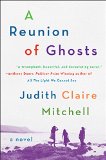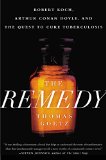Summary | Excerpt | Reading Guide | Reviews | Beyond the book | Read-Alikes | Genres & Themes | Author Bio

A Novel
by Lauren BelferA Fierce Radiance is a sweeping blend of fact and fiction, full of authentic details about the time period and the subject. I was impressed by how much information Lauren Belfer was able to pack into her novel, not just about penicillin, but also concerning New York during World War Two, the history of Life magazine, and the Rockefeller family's philanthropy. In spite of all this information, it's presented to the reader quite naturally, without feeling like exposition. Belfer achieves this effect by focusing on two lead characters: Claire, a photojournalist who is reporting on the development of penicillin, so that we learn all about this miracle drug along with her; and James, a researcher at New York's Rockerfeller Institute. Living in an era when people routinely died from a scrape on the knee, both Claire and James are intimately familiar with disease; Claire lost a daughter to infection, while James' parents died during the great Spanish Flu epidemic of 1918. Watching as James and his fellow researchers experiment with the drugs proves incredibly suspenseful.
The novel captures the uncertainty felt in America right after Pearl Harbor. New Yorkers carried gas masks with them everywhere, and wondered if the city would be bombed. Claire and her son follow the various battles in the papers, and victory for the allies is by no means guaranteed. However, life continues, as does romance. While it was clear from their first meeting that Claire and James would come together, because of James' war work, their relationship goes through several unpredictable twists and turns, and their love is tested in unexpected ways. The passion and explicit thoughts these two have for each other is one of the most powerful aspects of this novel.
I was struck by how Belfer manages to complicate almost all of her characters, so that they're not simply heroes or villains. Edward Rutherford, Claire's millionaire father, is a wonderful example. He makes many decisions which verge on the criminal, and his justifications make him seem ruthless; yet he truly loves his family, and yearns to reconnect with his daughter. From government officials taking extraordinary steps to protect the secrets of penicillin, to journalists deciding whether to investigate medical testing on interned Japanese-Americans, A Fierce Radiance demonstrates how difficult it is for ordinary people to do the right thing in extraordinary circumstances.
The pharmaceutical industry does come under great criticism, however, for their double-dealings and secrecy. Asked by the government to develop large quantities of penicillin, and not allowed to patent their research, they find loopholes allowing them to patent related antibiotics. One of the most disheartening scenes involves Claire, on assignment for Life, being shown around a room filled with huge vats at a company's headquarters, supposedly full of cultures growing the drug. She quickly realizes, though, that the room is for show, and that the real work goes on behind secure doors, where cameras are not allowed. With all their legal manipulations and hoarding of resources, it would seem that not much has changed in the world of pharmaceuticals in the past 60 years.
Readers looking for a fascinating story, with fallible, all too human characters, and engrossing details about a time and place not too far removed from the present, will enjoy A Fierce Radiance. Belfer conjures up a world where death can come from the prick of a rosebush, and where the choices people make can determine the fate of millions.
![]() This review was originally published in The BookBrowse Review in July 2010, and has been updated for the
April 2011 edition.
Click here to go to this issue.
This review was originally published in The BookBrowse Review in July 2010, and has been updated for the
April 2011 edition.
Click here to go to this issue.

If you liked A Fierce Radiance, try these:

by Judith C. Mitchell
Published 2016
Three wickedly funny sisters. One family's extraordinary legacy. A single suicide note that spans a century...

by Thomas Goetz
Published 2015
The riveting history of tuberculosis, the world's most lethal disease, the two men whose lives it tragically intertwined, and the birth of medical science.
Your guide toexceptional books
BookBrowse seeks out and recommends the best in contemporary fiction and nonfiction—books that not only engage and entertain but also deepen our understanding of ourselves and the world around us.